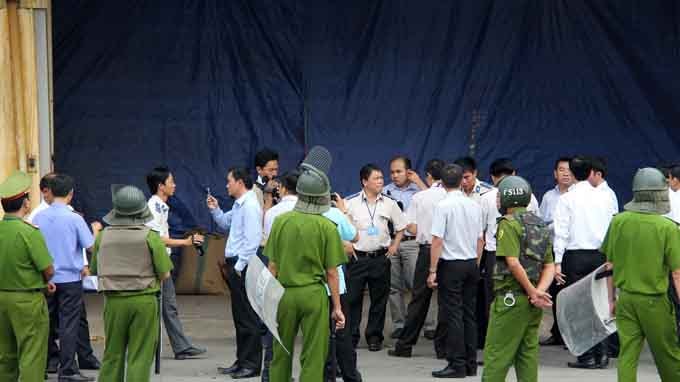Failed to collect debt, 7 banks "ask for help" from the police
The banks have sent documents to the Department of Investigation Police on Economic Management and Position Crimes (C46, Ministry of Public Security) requesting clarification of signs of "fraudulent appropriation of property" against Truong Ngan Company..
 |
| The banks have sent documents to the Department of Investigation Police on Economic Management and Position Crimes (C46, Ministry of Public Security) requesting clarification of signs of "fraudulent appropriation of property" against Truong Ngan Company. |
More coffee bags containing "garbage" discovered
On December 5, a representative of a bank (NH) among seven banks (MB, MSB, VietinBank, VIB, OCB, Agribank and Techcombank) which is the "creditor" of Truong Ngan Company Limited (headquartered in District 4, Ho Chi Minh City, warehouse in Di An town, Binh Duong) said that he had just sent a document to the Department of Police Investigation of Crimes on Economic Management and Positions (C46, Ministry of Public Security) requesting clarification of signs of "fraudulent appropriation of property" against Truong Ngan Company.
Some remaining banks also sent petitions to Ho Chi Minh City Police or the Ministry of Public Security requesting clarification of criminal signs against this company.
In the petition sent to C46, this bank stated that the leaders of Truong Ngan Company used a shipment of goods as collateral for 7 banks. Up to now, the company has lost its ability to pay. Truong Ngan Company also could not prove what the source of money borrowed from credit institutions was used for, why the imbalance...
In addition, some banks also continued to send petitions to the Supreme People's Procuracy and the Supreme People's Court requesting a final appeal, declaring the decision of the District 4 People's Court to recognize the agreement between Phuong Dong Bank (OCB) and Truong Ngan Company on determining the loan debt and the amount of mortgaged coffee (Di An Town Civil Judgment Enforcement Department forcibly seized the warehouse of Truong Ngan Company from December 3 to recover debt for OCB). A bank said that the District 4 People's Court's decision to recognize the above without inviting the remaining banks was a violation of procedural law.
Meanwhile, at Truong Ngan Company's warehouse, out of six coffee trucks transported by the force on December 5, only three trucks contained coffee beans, the remaining three trucks contained "garbage" bags (containing coffee husks, impurities...).
A representative of Lua Viet Appraisal Joint Stock Company (HCMC) hired to conduct the appraisal said that the deeper the coffee was taken into the warehouse, the more “garbage” bags were discovered. Of the 11 coffee trucks that were shipped the day before, only eight were coffee trucks, the remaining three were “garbage”.
This could be a new factor when the authorities consider criminal signs at Truong Ngan Company because this company may have used the above "garbage" bags to deceive banks when borrowing capital.
In another development, yesterday, OCB spoke out about the fact that some related banks said that the court's decision allowing OCB to handle secured assets was illegal because it handled duplicate secured assets of banks that also had outstanding debts at Truong Ngan Company.
According to OCB, there are differences in the methods of receiving collateral between banks. OCB accepts collateral with specific batches of goods according to the principle of cash in and goods out, while some banks accept collateral using an extremely risky method in credit management, which is mortgaging circulating inventories.
“This is a method of guarantee in which the customer simply commits to the bank to maintain a certain amount of goods with a certain value in the warehouse, while the right to import and export goods belongs to the enterprise, the bank cannot directly control. Therefore, banks lending under this method find it difficult to determine whether the amount of goods is in the warehouse or not, or which goods are mortgaged to the bank” - OCB said.
According to TT
